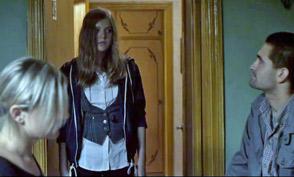 |
|||||||
|
|||||||||||
Written and directed by established Ukrainian director Volodymyr Tikhyi, The Green Jacket (2013), Zelena Kofta in Ukrainian, is a psychological thriller that exposes our most human vulnerabilities. The film focuses on a family living in the suburbs of Kyiv, the capital of Ukraine, specifically on the teenage daughter Olia (played by Oleksandra Petko). The family is sent into a state of emotional purgatory as something happens to the six-year-old son, Mykhas (Ivan Baklan), while under Olia’s care. As the story unfolds, it becomes evident that Olia’s hysterical mother (Lesya Kalynska) and apathetic father (Taras Tkachenko) are unable and almost unwilling to deal with the recent events. Witnessing the incapability of the adults in her life, Olia decides she must take matters into her own hands to save her brother, and perhaps even herself. Through the use of dramatic and dynamic camera angles, unpredictable characters, and the relentless reality of the urban landscape, the film grabs the viewer and doesn’t let go. The Green Jacket is comparable to contemporary films that explore extraordinary situations with ordinary people, making it almost painful to watch yet igniting powerful intrigue. The film wonderfully keeps the viewer guessing at what is hiding behind the bend without losing interest or becoming too fantastical. Every move is unexpected yet deliberate and at the end, the viewer must ask themselves what they are ready to do to protect their family. Viewers are exposed to the wide array of themes and issues present in Ukrainian society through the film’s portrayal, such as the inexistence and ignorance of the Ukrainian system of justice, especially at the local level, and the existence of rampant and unchallenged corruption. The deafening isolation of Ukrainian suburbs, as if existing on a different Earth, is starkly represented in the film’s setting of an ambiguous and undistinguishable Kyiv suburb, with its dehumanizing Soviet architecture as manifestation of the cultural and spiritual devastation inflicted upon Ukrainians by the Soviet system, which is still very much present in post-Soviet Ukraine today. Perhaps one theme that is universal in almost every contemporary film is the degradation of the traditional family unit. While Western films have been grappling with the issue for the past three decades, Ukraine as a country has only very recently begun to artistically discuss the family psyche and what it means to be a family. The Green Jacket features a family consisting of a recently separated single mother responsible for two children while their father has already begun a new life with a new family, almost forcing the single mother to cope with her situation, which has been made worse by the tragedy involving her son Mykhas, by becoming emotionally and physically unavailable. Also notoriously missing in action are the police, and the viewer begins to empathize with Olia’s determination to take on so many roles at once – mother, father, investigator, policeman, and final judge. However, one point of dissonance perforating the film that non-Ukrainians may not catch is the dual-identity Ukrainians struggle with, in reference to the Ukrainian and Russian languages. Only the main character, Olia, speaks Ukrainian. Every other character switches between Ukrainian and a Ukrainian-Russian macaronic mixture called Surzhyk. The Green Jacket is one of very few films to have ever openly brought the issue of the Russian and Ukrainian languages in Ukraine to light. In fact, the climax of the storyline is also the climax of the tension between ’s use of Ukrainian amongst Surzhyk speakers. The Green Jacket is a breakthrough Ukrainian film; it cinematically brings to the forefront Ukrainian culture, society, and people in a way an audience can consume it and succeeds in having the audience beg for more. Many questions are left unanswered and there are many loose ends, but by no means are there any unfinished details. The viewer is guided by curiosity and hope, something that Ukraine as a country needs right now at such a difficult time. Maryna Prykhodko, |
|||||||||||
